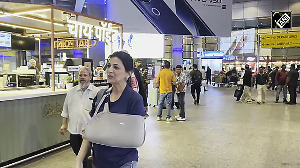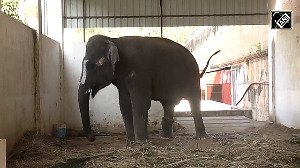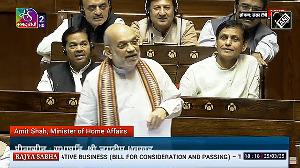 'China might soon have to seriously consider whether it prefers an Indo-US hyphenation to a Sino-Indian one,' says Ramananda Sengupta.
'China might soon have to seriously consider whether it prefers an Indo-US hyphenation to a Sino-Indian one,' says Ramananda Sengupta.
For years New Delhi had bristled at what it called an 'Indo-Pak hyphenation,' which implied that somehow the two rival nations were at par.
"The only commonality we have is that both of us are nuclear weapons States," a senior Indian diplomat told me a decade ago. "Yet the world can't even mention India without bringing up Pakistan in the same breath."
Today, Beijing resents a similar Sino-Indian hyphenation, given the huge gaps -- both political and economic -- between the two nations. Repeated and persistent media reports that the United States hopes to use India as 'balance' against rising Chinese influence in the region add fuel to that simmering resentment.
So perhaps it is not surprising that US President Barack Obama's visit to India as the chief guest for the January 26 Republic Day parade has been written off as 'more symbolic than pragmatic'; by the Chinese media.;
(Incidentally, Obama's visit to India coincided with a two-day visit to China by Pakistan's army chief, General Raheel Sharif, who was hosted by the People's Liberation Army top brass and assured of all help in Pakistan's crackdown on Islamic extremists.)
'Three days are surely not enough for Obama and Modi to become true friends, given their hard differences on issues like climate change, agricultural disputes and nuclear energy cooperation,' Xinhua noted in a January 25 editorial titled 'US, India unlikely on same page.'
Later that day, Prime Minister Narendra Modi and President Obama announced that the 'two countries have reached an agreement to break a six-year impasse on the landmark civil nuclear deal.'
Expressing optimism over better trade ties and 'working together for climate change,' the US president declared that 'deepening ties with India will remain a top foreign policy priority for our administration.'
The strong personal chemistry between the two leaders was clearly visible at the joint press conference at Hyderabad House, with Modi addressing Obama by his first name. 'My personal ties with Barack have not only brought Delhi and Washington closer, it has also brought people of both countries closer. We talk to each other freely and crack jokes,' he said.
'Today, we have also decided to take our growing defence cooperation to a new level,' Modi added. 'We have agreed, in principle, to pursue co-development and co-production of specific advanced defence projects... These will help upgrade our domestic defence industry; and expand the manufacturing sector in India. We will also explore cooperation in other areas of advanced defence technologies.'
The next day, as Modi and Obama attended the Republic Day parade -- which essentially showcases India's military might --- in New Delhi, Chinese leaders sent congratulatory messages to their Indian counterparts.
'Both China and India, as two ancient civilisations, are pursuing a great dream of national rejuvenation. China is delighted with India's achievements in its development,' Chinese President Xi Jinping told President Pranab Mukherjee.
Pointing out that 2015 marks the 65th anniversary of the establishment of diplomatic relations between the two countries, Xi said China is 'willing to make concerted efforts with India to lift their strategic cooperative partnership oriented to peace and prosperity to a higher level.'
In his message to Prime Minister Modi, Chinese Premier Li Keqiang said that in recent years the two nations have kept a 'stronger momentum in joining hands for cooperation and seeking common development. China is ready to work with India to deepen their mutually beneficial cooperation in various fields and build a closer partnership of development.'
Another report the same day in the Global Times, however, warned that 'India, China mustn't fall into trap of rivalry set by the West.'
'Recent years have witnessed a tendency in international public opinion that whenever India makes a move, it is perceived to be aimed at China. This time, the stereotyped mindset seems to have prevailed again when the US president and Indian prime minister hugged in New Delhi,' the report said.
'This fixed pattern of thinking was created and hyped up by the West, which, with ulterior motives, regards the "Chinese dragon" and the "Indian elephant" as natural rivals,' it asserted.
'A zero-sum game is not what China and India are asking for, but under Western influence, India is sliding into it. Beijing and New Delhi should come to terms with a bottom line of interactions, making sure the big picture remains intact, although both sides still have disagreements on some specific matters.'
The comments below the article from readers in India and China starkly underline the Indian distrust of China, and Chinese distrust of both India and the US.
Leaving hyphenations and symbolism aside, President Obama's visit to India should be seen through two main prisms: strategic and economic.
Strategically, the almost decade- old deadlock over the nuclear deal appears to be broken, though the details remain sketchy.
'Modi is willing to engage on long-term issues that stretch beyond India's border, including maritime security in the South China Sea, as well as North Korea and Islamic State militants in Iraq and Syria,' Reuters quoted Richard Rossow of the Centre for Strategic and International Studies, a policy think-tank in Washington, DC, as saying. 'That's when we start to think about India as a regional global provider -- or as a global provider of security.'
Modi's relentless, aggressive drive to put India at the world's top table appears to paying off, though it is still too early to break out the champagne. Long-standing suspicions about American intentions and its 'reliability' as a strategic partner haunt the corridors of power in New Delhi.
Economically, Modi's 'Make in India' call has been buoyed by the dramatic drop in oil prices and bullish markets. Investors, both domestic and foreign, appear confident that the Union Budget next month will have measures that further simplify doing business in and with India.
Obama's announcement of $4 billion in government-backed investments and lending to India, half of it for renewable energy projects, is the American icing on the Indian cake.
Meanwhile, China might soon have to seriously consider whether it prefers an Indo-US hyphenation to a Sino-Indian one.
While Pakistan risks being hyphenated with North Korea.
Image: US President Barack Obama, right, and wife Michelle at the State banquet hosted by President Pranab Mukherjee, left, at Rashtrapati Bhavan on Sunday, January 25, 2014. Photograph: Rashtrapati Bhavan/Twitter.
Ramananda Sengupta is an independent foreign and strategic affairs analyst.











 © 2025
© 2025